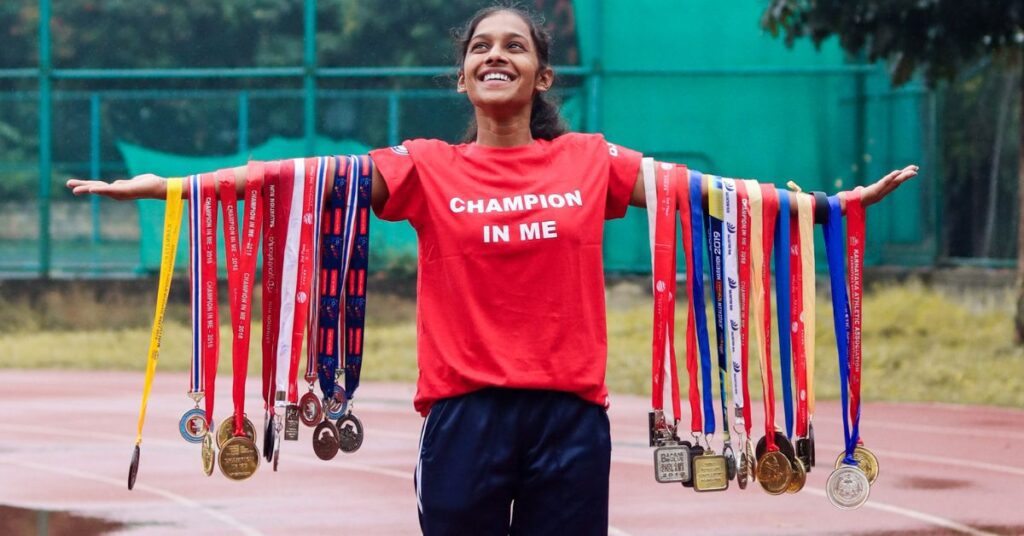Sonika Sanju Kumar found her rhythm on the running track, a space that transcended the stigmas attached to her life as a person living with HIV. The track became her sanctuary, a place where the chatter of societal misunderstanding faded with each steady footfall. The experience of being treated differently had shaped much of her formative years—she often navigated a world of isolation, marked by the weight of her condition. Food was served on separate plates, and the boundaries imposed by fear kept her distanced from peers. Yet, in this journey, sport became her lifeline; it was not merely a distraction but a profound medium for self-discovery and resilience.
Sonika’s entry into athletics has roots in an initiative called “Champion in Me,” which provides a structured environment for children impacted by HIV to engage in sports. Established by the Bangalore Schools Sports Foundation and spearheaded by Elvis Joseph, the program offers training and mentorship. For Sonika, whom Elvis recognized as having the potential to excel, this opportunity to train under guidance was transformative. The predictable stressors of training began to eclipse the chaotic emotional landscape of her earlier years.
Training in endurance sports, unlike some other athletic pursuits, demands a nuanced understanding of pacing, both in the literal and abstract senses. Sonika learned to meter her efforts, to find sustainable rhythms amidst physical and mental challenges. In endurance athletics, where the goal is often to extend one’s limits through sustained effort over time, the value of comprehensive mindset adaptation cannot be overstated. The process isn’t merely about finishing a race; it’s about growling through self-doubt, confronting fatigue, and wrestling with thoughts that seek to pull you back into the comfort of the familiar.
One of the remarkable aspects of Sonika’s story is the manner in which her initial experiences of the sport fostered her intrinsic motivation. Every lap run on the track, every hurdle overcome, rang with the clarity of purpose. She secured a third-place finish in the women’s category at the 2018 Kolkata marathon, an achievement that spoke of grit forged in the fires of adversity. Running nurtured her sense of agency, reminding her that in a world filled with judgment, she could define her own narrative on her own terms.
The sense of community instilled within the “Champion in Me” program mirrors the social fabric of many sports circles. Endurance athletes often find solace and strength not only in individual pursuits but within the collective struggles and shared victories of their peers. Training alongside fellow athletes created a network of support and mutual encouragement—elements crucial in navigating the long hours of preparation and the inevitable challenges of competition.
As endurance athletes know, running teaches you to face discomfort with resolve. It’s about adapting, understanding when to push the limits, and when to conserve energy. This is something that Sonika embraced wholeheartedly. The track became less about escaping her past and more about carving out her future. Through training, she found the strength to handle both physical but also emotional demands, translating them into newfound confidence and self-belief.
Elvis Joseph, the driving force behind this initiative, highlights the essence of endurance in his philosophy. He frames sports as an empowering tool capable of dismantling adversities faced by marginalized youth. His work transcends mere athletic training; it’s about nurturing essential life skills such as resilience and discipline, echoed in the training regimens that demand both physical and mental stamina. The initiative has transformed countless lives, from the local circles of Karnataka to international platforms, demonstrating that the essence of sport—especially endurance sports—can transcend barriers and create opportunities.
Two key figures, Sonika and a fellow athlete named Manik, are testaments to the profound impact of consistent training and the nurturing of resilience. Both faced societal rejections due to their HIV-positive status but learned to harness the energy typically spent on fear and stigma to drive them through races and challenges. Their stories remind athletes that the pursuit of excellence often lies in confronting external pressures—such as societal stigma—and overcoming them one training session at a time. The focus on internal growth creates a foundation upon which they stand firm, ready to face both external expectations and their personal limits.
Endurance challenges athletes biologically, mentally, and emotionally. The community built through initiatives like “Champion in Me” reflects that struggle but also showcases the collective triumph that emerges from shared experiences. It teaches that every athlete, regardless of background or circumstance, possesses untapped potential, waiting to be realized through dedication and training.
As you lace up for your next long session, keep in mind that resilience isn’t just about powering through physical exhaustion; it’s about embracing the process, understanding the gravity of each step taken, and allowing your environment—be it supportive peers or the quiet of solitude—to shape your journey. In the face of challenges, find strength in both your pace and your community, and remember that every run offers an opportunity to redefine not only your limits but also your identity as an athlete.
